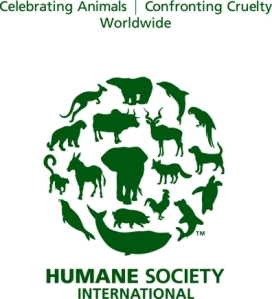According to the Food and Agriculture Organization (FAO) of the United Nations, globally, around 65 billion land animals were raised for human consumption in 2007.
An overwhelming number of laying hens, pregnant sows and calves raised for veal are kept in battery cages, gestation crates and calf crates increasing the suffering and stress of these animals.
In Brazil, more than 70 million laying hens are intensively confined in so-called battery cages, to produce eggs. The cages are so overcrowded that the birds are unable to walk, exercise or stretch their wings. The animals live in these degrading conditions for approximately a year and a half, when egg productivity tends to decrease, the layers are sent to slaughter.
Pigs are also victims. There are currently around 1.5 million breeding sows in Brazil being housed in gestation crates—individual metal stalls so small that the sows cannot even turn around inside them.
The intensive confinement of these production systems severely harms the welfare of the animals, who are unable to exercise, stretch their limbs or express many important natural behaviors. As a result of the severe restriction of these housing systems, animals can experience significant and prolonged physical and psychological aggression.
Some studies state that if the animal is stressed, abnormal or extreme adjustments to its physiology are necessary to adapt to adverse aspects of the environment. These studies have shown that inadequate treatment of pigs before stunning affects the final quality of the meat, even when they have been handled carefully.
Pre-slaughter stress can negatively affect the quality of the meat in its initial characteristics, such as pH, temperature and rigor mortis (muscle transforming into meat). Pre-slaughter handling includes a wide variation of different physiological and psychologically stressful methods, such as: mixing unfamiliar animals with each other before slaughter, loading, transport, unloading, pen situation and driving to the slaughter line. A long period of stress is generally associated with DFD (dark, firm, dry) meat.
Since 2008, the Humane Society International (HSI) has been working in Brazil to improve the conditions of animals raised for consumption and raise awareness about the impacts of the livestock industry on animal welfare, the environment and public health. To achieve its goals, HSI has formed partnerships with suppliers, producers, government agencies, consumer groups and other NGOs.
Because of this, HSI launched a public petition asking for legislative measures that address the most cruel and inhumane practices in industrial livestock farming and that reduce the suffering of animals raised for consumption in Brazil.
The petition can be used to encourage legislative initiatives at any level – municipal, state or federal. Initially, it will be presented to São Paulo councilor Roberto Trípoli (PV/SP). Delivery will take place on November 17th.
The proposed bill will require the City of São Paulo to purchase eggs produced without the use of cruel “battery cages” for school meals, replacing the conventional industrial eggs used today. If enacted, such a law would save tens of thousands of chickens from extreme suffering.
The signatures are intended to show legislators that the population does not want cruelty against animals raised for consumption to continue. However, the support of civil society organizations operating in different segments is also very important to show that concern about animal cruelty is present in a representative way in society.
Therefore, we at the Prato Cheio and HSI Association would like to count on your support until November 17th.
To sign this petition, click on this link and help this cause: http://e-activist.com/ea action/action?ea.client.id=1684&ea.campaign.id=12355
An alternative is to send a message to the Councilor Roberto Trípoli, who is willing to take on this bill. The contacts are:
Email: vtripoli@uol.com.br or contato@robertotripoli.com.br
(We kindly ask you to send a copy to brasil@hsi.org)
Telephone: (11) 3396-4522.
Address: Councilor Roberto Trípoli’s Office
São Paulo City Council
Viaduto Jacareí, 100 – 7th Floor – Room 705 – Bela Vista
São Paulo – SP – CEP: 01319-900
Source:
http://www.hsi.org/portuguese/issues/campanha_brasil_portugues.html
http://dgta.fca.unesp.br/carnes/Alunos%20PG/Zootecnia/roca309.pdf
http://www.cnpgc.embrapa.br/publicacoes/doc/doc77/03nocoescarne.html#3.3.2
http://www.hsi.org/portuguese/news/press_releases/2011/10/brazil_law_petition_101311.html



